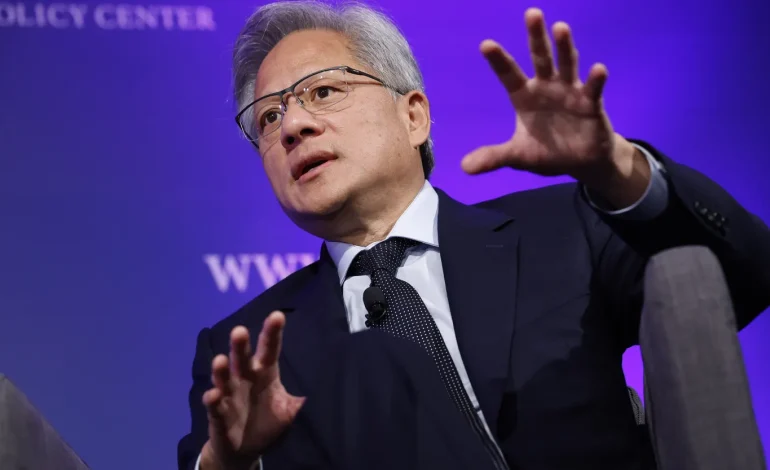China has opened an antitrust investigation into Nvidia, the world’s leading provider of AI-powered processors.
The move marks a significant escalation in the US-China technology rivalry, with both countries seeking to control the future of artificial intelligence (AI) and chip manufacturing. The probe centers on Nvidia’s 2020 acquisition of Israeli networking company Mellanox, with China’s State Administration for Market Regulation (SAMR) citing potential violations of the country’s anti-monopoly laws.
According to a statement from the SAMR, Nvidia is being scrutinized for possible breaches of China’s anti-monopoly regulations related to its acquisition of Mellanox. The Chinese regulator stated that the probe was launched in response to “restrictive conditions” surrounding the transaction. While Mellanox’s acquisition received approval from Chinese authorities in 2020, the current investigation suggests that Beijing may be revisiting its initial clearance.
Nvidia has not issued an official response to the announcement. Shares of the company slipped about 2% in premarket trading on Monday following news of the probe. This setback is a small dent in Nvidia’s otherwise strong market performance this year, where its stock has surged nearly 188%, driven by investor enthusiasm for AI-related technologies.
The Nvidia probe is the latest development in an ongoing geopolitical struggle between the US and China over dominance in AI and semiconductor technologies. The United States has implemented multiple rounds of export controls aimed at limiting China’s access to advanced AI chips. These measures are intended to prevent China from leveraging US technology to bolster its military capabilities.
In response, Nvidia and other US chipmakers have sought to create new products that comply with US export restrictions. However, these efforts have done little to ease tensions. The Biden administration’s most recent round of export controls, introduced last week, further restricted the sale of advanced semiconductor tools to China, marking the third round of such measures since 2022.
China has retaliated with its own countermeasures. Last week, Beijing announced a ban on the export of key materials used in chip manufacturing, including germanium and gallium — two critical components in the production of semiconductors. These materials had previously been subject to export controls with loopholes, but those exceptions have now been eliminated, signaling China’s intent to hit back at US chipmakers.
Nvidia is a key player in the global AI race. Its cutting-edge graphics processing units (GPUs) are essential to the development of AI systems, such as large language models, self-driving cars, and cloud computing infrastructure. Any disruption to Nvidia’s ability to operate in China could have broader implications for the company’s role in AI development worldwide.
Nvidia’s chips are seen as critical components of the global AI boom, with its market capitalization surpassing $3 trillion, second only to Apple. Over the past two years, Nvidia has emerged as the face of the AI revolution, and its success has fueled a rally in the broader tech sector.
The company’s dominance in the AI chip sector has also drawn scrutiny in the United States. According to Bloomberg, Nvidia is currently under antitrust investigation in its home market, reflecting concerns about its market power as AI adoption accelerates.
The US and China are both making moves to reduce their reliance on each other for semiconductor technology. The Biden administration has enacted the CHIPS Act, which directs billions of dollars toward boosting US chip production. Intel, one of Nvidia’s key competitors, has been a major beneficiary of the CHIPS Act as it works to expand its domestic production capacity.
China, for its part, announced plans in May 2024 to establish a $47.5 billion state-backed semiconductor investment fund, supported by six of the country’s largest state-owned banks. This fund is intended to drive domestic production of advanced microprocessors and reduce China’s dependence on US-made chips.
The battle for chip independence extends beyond supply chains to intellectual property and human capital. Senior US officials have accused China of stealing American-developed AI software, allegations that Beijing denies. Both nations are racing to build homegrown semiconductor production capacity to ensure access to critical technologies.
The antitrust investigation into Nvidia could have far-reaching consequences for the broader US-China chip rivalry. Analysts suggest that China’s probe may be a strategic move to increase its leverage amid growing US restrictions on Chinese access to AI-related technology.
For Nvidia, the immediate financial impact appears limited, as the company’s stock has seen only a modest decline. However, if the investigation results in fines, operational restrictions, or limitations on Nvidia’s business in China, it could affect the company’s long-term growth prospects in the world’s second-largest economy.
The escalation of tit-for-tat measures between Washington and Beijing reflects the growing importance of chips to national security, technological leadership, and economic competitiveness. The coming weeks will be critical as both sides weigh further retaliatory actions.









